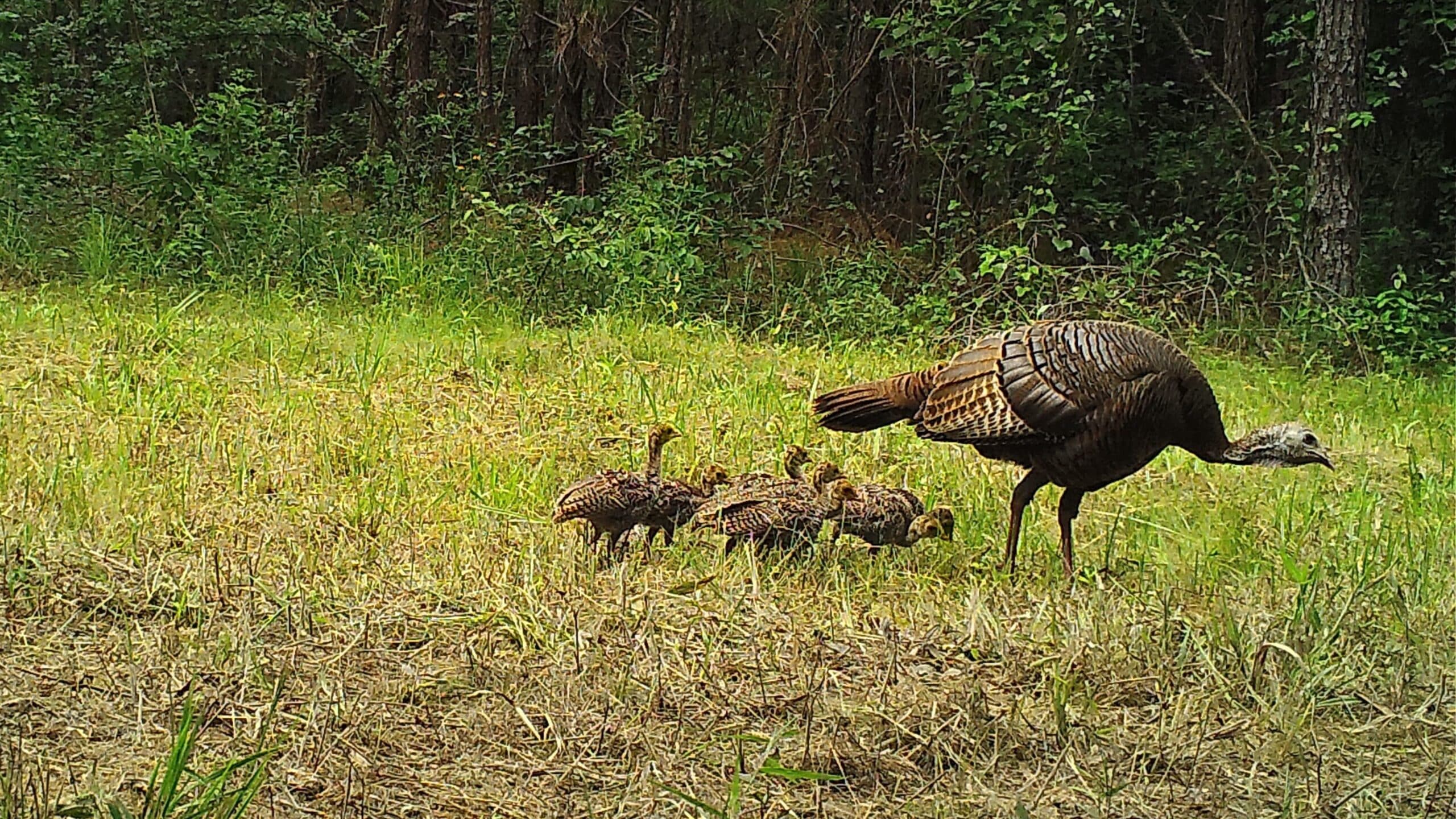Timing of Turkey Nesting May Not Shift With Changing Climate

For Immediate Release
A new study suggests eastern wild turkeys in five southern U.S. states are unlikely to make meaningful changes in the timing of when they begin nesting, even under significant future climate change.
The findings suggest eastern wild turkeys (Meleagris gallopavo silvestris) could be vulnerable to shifts in climate, which could threaten the availability of their food sources, the amount of vegetation cover available to protect them from predators, and other factors.
“There are implications here for turkey populations if individuals are inflexible in their ability to shift their reproductive activities, as resources are certainly going to change in the future,” said Chris Moorman, professor in North Carolina State University’s Fisheries, Wildlife and Conservation Biology Program. “This could result in ‘phenological mismatch,’ where the timing of an animal’s natural history doesn’t match up with the food and cover resources that are critical for successful reproduction and survival.”
After overhunting and habitat loss drove wild turkeys almost to extinction, the species is now common throughout North America. However, a recent survey reported wild turkey populations in the southeastern United States have been in decline since 2009. North Carolina has a stable population as estimated by hunting harvests, but some southern states have set hunting restrictions in an attempt to stop or reverse declines. Researchers acknowledge there are outstanding questions about the role of weather and climate change, emerging diseases, and other factors on turkeys.
“Turkeys are a highly adaptable species; this adaptability facilitated their ability to be restored,” said the study’s lead author Wesley Boone, a postdoctoral research scholar at NC State. “We want to know if they’re going to be able to persist in a future with a changing climate, and changing landscapes, too.”
To determine the impact of climate change on turkey nesting, researchers tracked when eastern wild turkeys began nesting in five states in the Southeast across eight years. Working under safety protocols, researchers used nets to capture female turkeys. They attached GPS transmitters to monitor the turkeys’ location remotely to identify patterns in their movements that indicated turkeys had started incubating their nests, which is when they sit on their eggs to keep them warm. They visited nests to confirm their location and to see if one or more eggs had hatched.
The researchers then used weather data gathered between 2014 and 2021 to see if temperature, rainfall, and the timing of “spring green-up” linked with the timing of when turkeys started nest incubation. They also projected whether turkey nest timing would shift by 2041-2060 under two climate-change scenarios.
When they analyzed the timing for 717 total nests and 186 “successful” nests that hatched at least one egg, researchers found that temperature and rainfall were associated with slight changes in when turkeys began nesting. However, the changes were so slight that they could be measured in hours, and not days.
When they looked at the relationship between climate change-related shifts in average precipitation and temperature changes, they found the timing of successful nests would change by less than three hours. The research team did not see any links between turkey nest timing and spring green-up.
“We did find relationships between nest timing, rainfall, and temperature, but when we projected that into the future, there is no biological relevance in the shift in timing,” Boone said. “However, the lack of change in response to a changing climate could be a problem because the critical food and cover resources linked with spring green-up are likely to shift earlier in the future.”
“For many animals, there is variability around the timing of breeding that would allow individuals to adapt to availability of resources,” Moorman said. “We did not project drastic changes in the timing of when wild turkeys nest under climate change. Turkeys seem relatively inflexible as to when they reproduce – nesting is initiated around the same time each year with only slight shifts in the timing, regardless of weather conditions.”
This is the first in a series of studies designed to understand the effects of climate change on reproduction of the eastern wild turkey. Future studies will explore other measures of turkey reproductive success, including whether temperature and precipitation affect the survival of turkey nests and the recently hatch young, which are called poults. The findings have implications for long-term turkey conservation, including the timing of hunting seasons.
“There could be a lot of factors interacting to cause declines, including timing of the hunting season, land-use change that impacts habitat, changes in predator populations, as well as weather, climate and diseases,” Boone said. “We need to begin chipping away at the questions to build a comprehensive understanding of the current and future threats to wild turkey population sustainability.”
The study, “Minimal shifts of eastern wild turkey nesting phenology associated with projected climate change,” was published online in Climate Change Ecology. Co-authors included Adam J. Terando of the U.S. Geological Survey Southeast Climate Adaptation Science Center; David J. Moscicki and Krishna Pacifici of NC State; Bret A. Collier of Louisiana State University and Michael J. Chamberlain of the University of Georgia. Funding was provided by the U.S. Geological Survey’s Southeast Climate Adaptation Science Center at NC State. Funding for field data collection was provided by the Georgia Department of Natural Resources Wildlife Resources Division; Louisiana Department of Wildlife and Fisheries; South Carolina Department of Natural Resources; U.S. Department of Agriculture Forest Service; Warnell School of Forestry and Natural Resources at the University of Georgia; the North Carolina Wildlife Resources Commission and National Wild Turkey Federation.
-oleniacz-
Note to Editors: The study abstract follows.
“Minimal shifts of eastern wild turkey nesting phenology associated with projected climate change”
Authors: Wesley W. Boone, Christopher E. Moorman, Adam J. Terando, David J. Moscicki, Bret A. Collier, Michael J. Chamberlain and Krishna Pacifici
Published: July 12, 2023, Climate Change Ecology
DOI: 10.1016/j.ecochg.2023.100075
Abstract: Climate change may induce mismatches between wildlife reproductive phenology and temporal occurrence of resources necessary for reproductive success. Verifying and elucidating the causal mechanisms behind potential mismatches requires large-scale, longer-duration data. We used eastern wild turkey (Meleagris gallopavo silvestris) nesting data collected across the southeastern U.S. over eight years to investigate potential climatic drivers of variation in nest initiation dates. We investigated climactic relationships with two datasets, one inclusive of successful and unsuccessful nests (full dataset) and another of just successful nests (successfully hatched dataset), to determine whether successfully hatched nests responded differently to weather changes than all nests did. In the full dataset, each 10 cm increase in January precipitation was associated with nesting occurring 0.46-0.66 days earlier, and each 10 cm increase in precipitation during the 30 days preceding nesting was associated with nesting occurring 0.17-0.21 days later. In the successfully hatched dataset, a 10 cm increase in March precipitation was associated with nesting occurring 0.67-0.74 days earlier, and an increase of one unit of variation in February maximum temperature was associated with nesting occurring 0.02 days later. We combined the results of these modeled relationships with multiple climate scenarios to understand potential implications of future climate change on wild turkey nesting phenology; results indicated that mean nest initiation date is projected to change by <0.1 day by 2040-2060. Wild turkey nesting phenology did not track changes in spring green-up timing, which could result in phenological mismatch between the timing of nesting and the availability of resources critical for successful reproduction.
- Categories:


